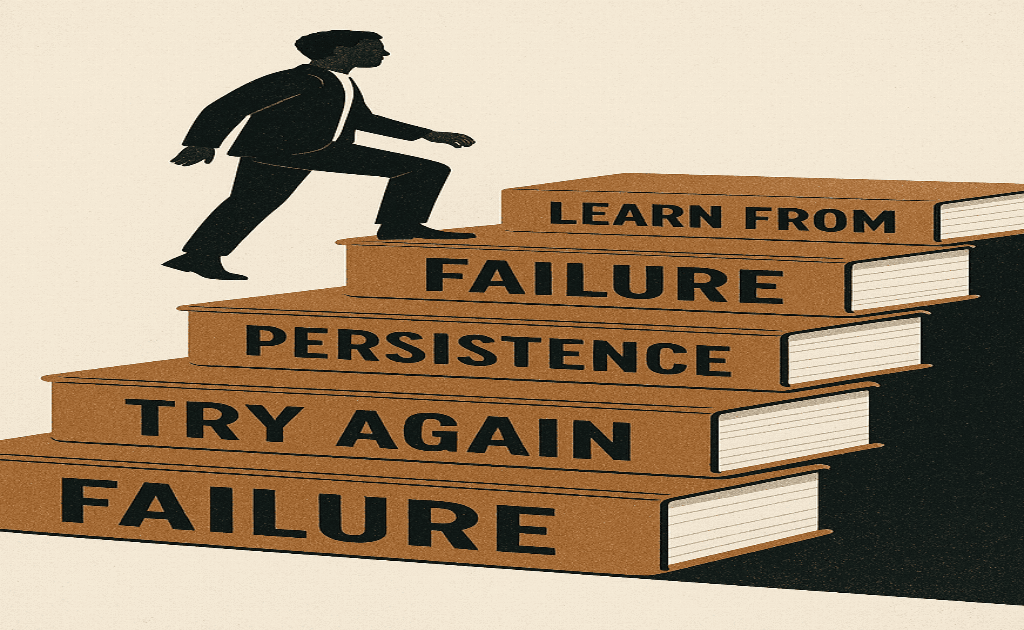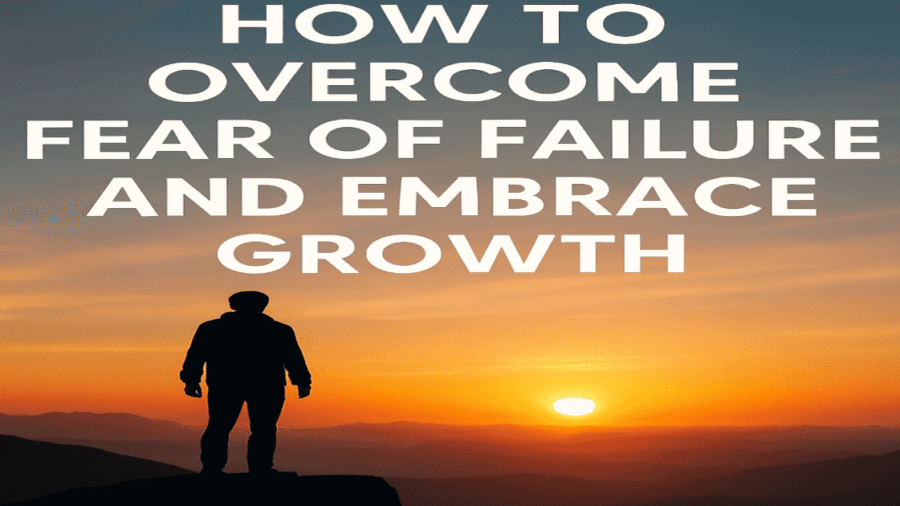Have you ever had a brilliant idea, a burning ambition, or a challenging goal but you hesitate? Not because you are incapable, but because that little voice in your head whispers:
What if I fail?
Or have you ever failed at something before? What was it you failed at?
Before you answer that, ask yourself: What is failure, really?
Who actually defined that incident to you as failure, society? Friend? Parents? Teachers? or Yourself?
In this comprehensive guide, we will delve into:
- The psychology behind the fear of failure
- Its root causes and effects
- Evidence-based strategies to overcome it
- The transformative power of a growth mindset

Understanding the Fear of Failure (Atychiphobia)
The fear of failure, also referred to as Atychiphobia, is an intense fear may cause an individual to avoid some situations where they feel they are likely to fail. This avoidance can manifest in various ways, like clinging to harmful situations or procrastinating when faced with new challenges.
In the early 2000s, a researcher named David Conroy set out to study this fear, and what drives the feeling of failure and how to overcome it. He discovered underneath the fear of failure are five sub-fears that powers it.
1. Fear of shame: If I fail, this will be so embarrassing, and can I really take that shame?
2. Fear of devaluing the way you see yourself: If I fail it will mean I’m not the person I thought I was and i will begin to feel worthless.
3. Fear of uncertain future: If I fail, it will derail my future hopes, it can end my career in the future.
4. Fear that it will change the way other people see me: If I fail people might not want to associate with me again, abandoned me, it can even damage my reputation.
5. Fear of disappointing people: If I fail, people who believed in me will be so upset.
And to add to it,
6. Fear of success: What if I succeed, can I actually keep up being successful? Will I be able to handle the possibility of an increased workload or the expectations.
So, which of these is fueling your fear of failure? If you can identify the one that is affecting you, then you can target it appropriately.
Again, the Diagnostic and Statistical Manual of Mental Disorders (DSM-5), a guide doctors use for mental health says: fear of failure can be classified as a specific phobia under anxiety disorders. Verywell Health+3Bay Area CBT Center+3Cleveland Clinic+3. This condition is characterised by the brain perceiving failure as something extremely dangerous, even when it is not. This also makes it difficult for individuals to try new things or take risks.

Common Symptoms Include:
- Overwhelming anxiety when faced with situations that seem challenging
- Procrastination– putting things off or delaying tasks especially when you are afraid you might not succeed.
- Physical symptoms like rapid heartbeat, sweating, trembling or nausea
- Pessimism– negative self-talk, low self esteem and constantly expecting the worst in every situation.
- Fear of disappointing others, including family, peers, or superiors.
Causes of Fear of Failure
Understanding the origins of this fear is crucial for addressing it effectively.
1. Childhood Experiences
Early life experiences, such as overly critical parenting or punitive school environments, or environments where failure is never tolerated, can potentially create a fear of making mistakes or even the fear of failure.
2. Perfectionism
Researchers like Conroy, Kaye and Fifer (2007) established that fear of failure is closely linked to perfectionism.
For example, people with unhealthy perfectionism (referred to as maladaptive perfectionism) often fear failure more because they have negative thoughts about what failure means. They try so hard to be perfect that even a small mistake can feel like a complete disaster.
3. Societal, Cultural or External Pressures
Society sometimes places some expectations that define what success is. These social norms usually link success to an individual’s worth. Therefore, individuals begin to fear that they will be unable to meet these expectations, and the fear of failure becomes even more severe. They start to believe that their value depends only on what they achieve.
4. Past Traumas
Previous failures, especially those that led to significant consequences, can create a lasting fear of repeating the same mistakes.
The Psychological Effect of Fear of Failure
The fear of failure does not only hinder your progress or hold you back, it has profound psychological effects:
- Anxiety and Depression: constant fear can lead to an ongoing feeling of stress, anxiety disorders, and even depression.
- Reduced Motivation: Fear of failure hinder your urge to go after what you truly want.
- Bad Performance: The irony is that fear of failure can actually increase the chances of failure due to stress, self-doubt, and overthinking.
Benefits of Embracing a Growth Mindset
- Resilience: The belief that challenges can be used as a learning opportunity builds tenacity and helps you learn to bounce back more easily from setbacks.
- Enhanced Learning: Believing and confidence in your ability to grow encourages continuous learning and improvement, even after mistakes.
- Reduced Fear: Accepting that failure as a normal part of the learning process reduces its ability to intimidate you and makes it more manageable.
Evidence-Based Strategies to Overcome Fear of Failure
1. Write your fears down.
When your fears are in your head, they have a lot of power over you. But when you write them down, they become a to do list that needs to be conquered.
I’m scared I cannot pass this exam becomes how will I manage my time to learn and write this exam so as to pass
2. Reflect on your Failed Adventures and Learn from Others Also.
If you have ever failed at something, do not worry failure is part of being human, everyone makes mistakes, but it is your ability to learn from it that matters.
The key question is: What did you learn from it? Have you made some changes that will prevent this failure from happening again?
You can also listen to people who have faced setbacks and how they persevered and overcame. You will learn that everyone faces failure, but you need to work and bounce back from it.
Try and see failure as a learning process by focusing on the lessons instead of what you have lost. This helps you move forward and not repeat same mistakes.
3. Self-Compassion Practices
When things do not go as planned, it’s only natural to want to be your own worst critic and continuously blame yourself. But being cruel to yourself just makes fear of failure even worse.
Instead practice being good to yourself. Keep in mind that failures come to everyone but they don’t define you. Failure is a longtime friend of success.
So the next time things do not go your way, be gentle with yourself. You are learning, you are growing and that is something to be proud of.
4. Visualise Success
Fear of failure normally stems from imagining the worst-case scenarios when faced with challenging situations. What if you did things differently, though?
Picture yourself as a successful in whatever you are afraid of doing. See yourself handling that challenge with confidence and reaching your goals. If you picture success, you’re putting your mind in the place of anticipating positive outcomes instead of bracing for failure.
But do not get too caught up with having a “perfect” result. Appreciate the little victories along the way, the effort, learning, and progress you make. These are all equally as valuable as the ultimate result and help build the strength to keep going.
5. Set Realistic goals
Mostly people who are afraid of failing set unrealistic goals for themselves which only increases the possibilities of failure. Breaking down goals into manageable steps can help reduce stress and build confidence through small victories.
6. View Failure as a Challenge or A Process of Growth
See whatever you are scared of as an obstacle that you are very much determined to conquer and then put your right foot forward and work on it.
Think of failure as a steppingstone to success and not the end.
Success is not final, and Failure is not fatal, it is the courage to continue that counts thus Stop seeing failure as a product.
7. Mindfulness and Stress Reduction
Mindfulness practices can help you stay in the moment. This mostly helps reduce the fear that comes from worrying about what might possibly go wrong.
Through simple exercises like deep breathing and meditation you can develop a non-judgmental awareness of your thoughts and feelings. Instead of getting caught up in fear or self-criticism, mindfulness helps you to observe those feelings without letting them have control over you.
With time, this practice builds emotional resilience and helps you respond to challenges with clarity and composure rather than fear and avoidance.
8. Build Confidence Through Action
Start small and see yourself overcoming your fears. Do not let the fear of failing paralyse you. When you want to build a growth mentality, then you need to take an action even when you are scared.
Sometimes, fear holds us back not because we are incapable, but because we are scared of what might go wrong. Fear of failure can make you take the back seat, shrink into silence and not trying at all. Put that right foot forward and you will be surprise how amazing you will perform.
And do not forget, The more you do, the less you feel scared and the more confident you become.
9. Positive Affirmations
Once the fear of failure starts to creep in, it is very easy to forget your strengths. That is why it is so important to remind yourself on a daily basis of things you are capable of doing.
Positive self-talk helps you in reminding yourself that you have what it takes to face difficult situations. Replace fearful thoughts with affirmations like, “I can do it,” “I have dealt with difficult things before,” or “Mistakes will only make me stronger.”
The more you practice this kind of self-reinforcement, the more natural it becomes, and the less power fear has over your mindset.
10. Seek Professional Help
If the fear of failure starts affecting your daily life or begins to cause ongoing distress, it’s time to seek help from a mental health professional/counselor. Don’t be afraid to call for help. Because asking for help is actually a sign of strength, in fact, and a move toward healing and growth. Several evidence-based therapies can help:
Cognitive Behavioral Therapy (CBT): This enables you to identify and challenge negative thought patterns and replace them with more helpful and realistic belief
Acceptance and Commitment Therapy (ACT): This urges individuals to accept their thoughts and feelings instead of fighting with or attempting to evade them.
Exposure Therapy: It involves gradually exposing yourself to situations that trigger your fear of failure in a safe and supportive way so that you can learn to tolerate and gain self-confidence gradually.
Conclusion: Turning Fear into Fuel for Growth

What is worse than the fear of failure is the regret of not trying at all. When you try and fail, you learn and have experience. This makes you even better than someone who has not even tried at all.
When Edison was asked what it feels like to fail so many times when he was trying to make a working light bulb, He said;
I did not fail; I only found so many ways that will not work
Thomas Edison
If not for anything be afraid of the regret of not trying because in the end, we only regret the chances we did not take.
REFERENCE
Conroy, D. E., Kaye, M. P., & Fifer, A. M. (2007). Cognitive links between fear of failure and perfectionism. Journal of Rational-Emotive & Cognitive-Behavior Therapy, 25, 237-253.



[…] more support in reframing your mindset during difficult moments, How to Overcome Fear of Failure and Embrace Growth provides reflective tools and strategies to turn self-doubt into […]
[…] reflects a lived experiences shared in “How Fear Made Me Kept Holding on Even Though I Was Hurting.” In this story, the writer reveals the deeper reasons why people cling to or release […]